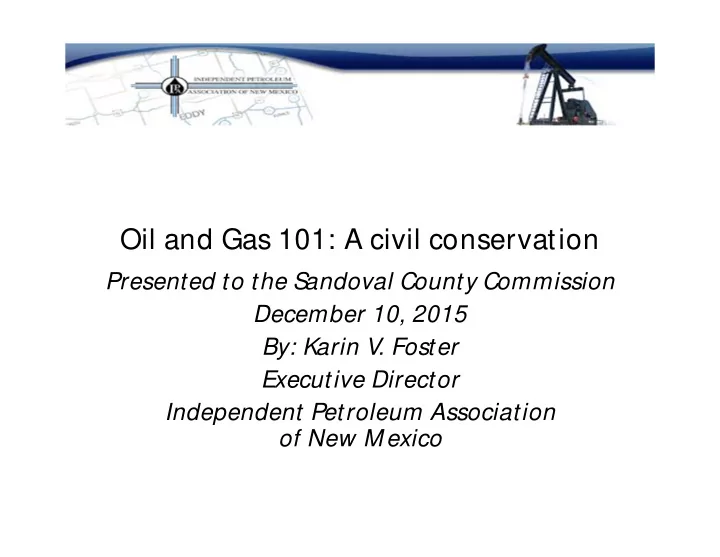

Oil and Gas 101: A civil conservation Presented to the S andoval County Commission December 10, 2015 By: Karin V. Foster Executive Director Independent Petroleum Association of New M exico
Chronology of a well • Geological review – is the resource there? • Leasing - How does an oil company obtain properties? • Drilling and Completion: How are resources extracted? • Regulations: What government oversight is there? • Other FAQs: Is there impact to water?
Fundamentals of Petroleum and Reservoir engineering • Overview of hydrocarbon properties • Geology overview • Reservoir mechanics • Formation evaluations
Hydrocarbon properties • Oil and gas are the liquid and gaseous forms of petroleum • Petroleum is a any naturally-occurring hydrocarbon found beneath the earth • Petroleum hydrocarbons occur in a variety of states GAS Volatile Liquid Semi-solid solid liquid Natural gas Condensate Crude oil Tar/ Bitumen Shale Increase in Carbon and hydrogen Increase in • chemical bonds Increase in energy content.
The Origin of Hydrocarbons • Source Rock – Where the hydrocarbon originates • Reservoir Rock – Where the hydrocarbon is stored • Seal Rock – Prevents seepage • Traps – Anticlines – Faults – Pinchouts – Source: WWW. Greatsouthlandminerals. com
Geology and Geophysics • Where do we look? Sedimentary Basins – Depressions in the earth’s crust allow for deposition and accumulation of sediments
San Juan Basin is listed as a top ten producer of Natural Gas in the US Source: EIA.gov/ oil-gas/ rpd.topfields.pdf Dec 3, 2015
Structural Geology - definition • Study of geological features produced by: – Deformation of the Earth’s crust • Fold or fault – Feature within a rock • Fracture • Bedding surface – Spatial arrangement of rocks
Structural geology - features Source: RM M LF Oil and Gas short course, Ehrman from Montello Resources
Identification of drill prospects - seismic • M ethod to determine the depth and orientation of rock formations without drilling Source: Baker Hostetler
Identification of drilling prospects
Leasing – gaining access to the resource 1. Increased leasing activity – Landmen, usually on contract with companies do title searches at the county court house – Talking to land owners about obtaining the rights to sever minerals (subsurface) and using surface to build locations, roads etc. 2. Permitting with Oil Conservation Division/ BLM 3. Bonding with NM OCD / BLM / SLO
Regulatory requirements to prior to drilling • Whose mineral are you extracting? – Private or State Trust – Private Contract, State lease and NM OCD oversight – Federal - BLM • Whose surface are you crossing? – Private or State Trust – Private contract as required by SOP A, State Right of way permits, NM OCD oversight – Federal – BLM with M OU • Split estate is a common issue in New M exico
Identification of drill prospects – exploratory drilling • The prospective geologic structure has been identified • How do we verify the interpretation? Drill a well • Numerous wellbore orientations
Identification of drill prospects- drilling
Identification of drill prospects - drilling • Types of wells – Wildcat Well • Pure exploratory development / new area • What is the extent of the resource? – Development Well • In a developed field or extension of an existing field – Dry Holes • Economic amounts of oil and gas are not present – Abandoned Well • Dry hole that has been filed with cement (plug and abandoned) and the ground has been restored.
Identification of drilling prospects - drilling
Well completion – typical process • Drill wellbore • Evaluate formation (well logging etc.) • Run casing into wellbore • Cement casing string into place • Perforate pay zone • Install tubing string • Identify stimulation requirements • Bring well on production
Well completion • Reservoir stimulation – M ay be necessary due to low permeability – Common stimulation methods • Chemical stimulation - acidizing • Physical stimulation – hydraulic fracturing – Hydraulic fracturing is the dominant technique in modern completions, especially in shales and tight gas reservoirs
Well completion • Hydraulic fracturing – Fractures are induced by pumping fluids into a formation at high rates and pressures • Polymers and cross-linked gels • Foams – Once fractures are created, proppants are pumped down to prop them open and create higher permeability • Sand • Ceramic beads
Hydraulic fracturing
Regulatory requirements during drilling/ fracking operations • Depending on whose mineral you are extracting – NM OCD and/ or BLM for APD – Dictates location and direction of well, surface impacts, surface facilities, ingress and egress, disposal of drill cuttings (closed loop systems), disposal of water from drilling and hydraulic fracking operations – NM OCD reporting of constituents used in HF operations – FracFocus
Other regulatory requirements • M onitoring air quality – NM ED and EP A and BLM – Environmental Quality Control Act – Clean Air Act • EP A and Army Corps of Engineers – Waters of the US • EP A and BLM – Hydraulic fracturing regulations • BLM , SHPO, NM SLO – Cultural resources • Surface
Fiscal impacts on a county of exploratory drilling • Unknown until the operator knows the resource (after that first well is operational) • The Impacts of Oil and Natural Gas Production in New M exico on Sandoval County A Summary of Important Economic and Revenue Issues • In 2013, Sandoval County producers shipped 1,080 thousand barrels of oil worth $86 million and 394.1 million M CF of natural gas worth $1.639 billion. • Source: New M exico 31, 2014 report, “ Oil and Natural Gas Production in New M exico”
What does production in Sandoval County mean for direct revenues?
Severance Tax and Capital Outlay
Thank you! • Please use IP ANM as a resource to you. If I don’t know the answer, I can find someone who will. • Consider also asking – New M exico T ech – New M exico Oil Conservation Commission Karin V. Foster Executive Director, IP ANM (505) 238-8385
Recommend
More recommend